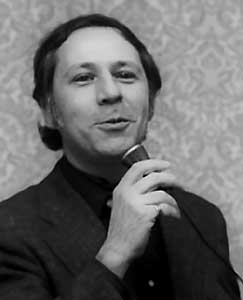A Quote by Hugo Gernsback
I started the movement of SF in America in 1908 through my first magazine, 'MODERN ELECTRICS.' At that time it was an experiment. Science fiction authors were scarce. There were not a dozen worth mentioning in the entire world
Related Quotes
Very little in science fiction can transcend the gimmickry of a technical conceit, yet without that conceit at its heart a book is not truly science fiction. Furthermore, so little emerging thought and technology is employed by sf writers today that the genre is lagging far behind reality both in the cosmology area and the technology area: sf is no longer a place to experiment, but is now very derivative.
[Modern science] passed through a long period of uncertainty and inconclusive experiment, but as the instrumental aids to research improved, and the results of observation accumulated, phantoms of the imagination were exorcised, idols of the cave were shattered, trustworthy materials were obtained for logical treatment, and hypotheses by long and careful trial were converted into theories.
There's a long-standing (50 year old) flame war within the field over whether it's "sci-fi" or "SF".SF has traditionally been looked down on by the literary establishment because, to be honest, much early SF was execrably badly written - but these days the significance of the pigeon hole is fading; we have serious mainstream authors writing stuff that is I-can't-believe-it's-not-SF, and SF authors breaking into the mainstream. If you view them as tags that point to shelves in bricks-and-mortar bookshops, how long are these genre categories going to survive in the age of the internet?
Science fiction is fantasy about issues of science. Science fiction is a subset of fantasy. Fantasy predated it by several millennia. The '30s to the '50s were the golden age of science fiction - this was because, to a large degree, it was at this point that technology and science had exposed its potential without revealing the limitations.
We discovered this halfway through the process. When we started making the film there were some lines of dialogue in Portuguese, but we then changed our minds. The film started from very specific issues in the world, in particular Latin America, but halfway through the journey we felt the necessity to have more universal ideas that were not so specific.
Today, the world is so awash in sugar - it is such a staple of the modern diet, associated with all that is cheap and unhealthy - that it's hard to believe things were once exactly the opposite. The West Indies were colonized in a world where sugar was seen as a scarce, luxurious, and profoundly health-giving substance.
Science fiction [is] the kind of writing that prepares us for the necessary mutations brought about in society from an ever changing technological world and as a result. The mainstream hasn’t excluded SF; the mainstream has excluded itself. No one told Jules Verne he was a science fiction writer, but he invented the 20th century.





































